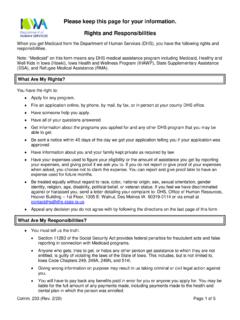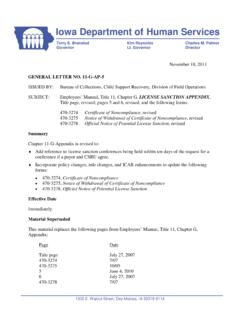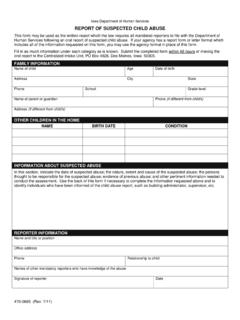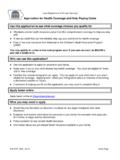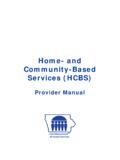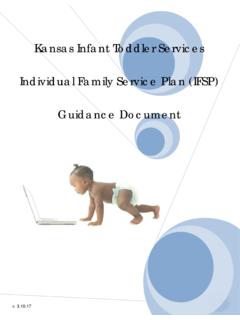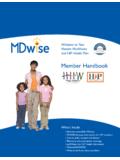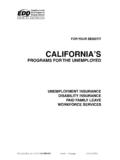Transcription of If you get your payments on the electronic
1 The family Investment Program (FIP) Comm. 108 (Rev. 10/16) Federal law limits how long you can get FIP to a total of 60 months (five years). Months you get FIP or cash assistance in another state count toward the limit. Months are not counted for: Persons on SSI Caretakers who don t get FIP for themselves. Caretakers are relatives who care for a child, but are not the child s parent. Children If a parent gets FIP for 60 months, FIP stops for the whole family . If a caretaker gets FIP for 60 months, the caretaker is taken off the FIP grant but FIP can continue for the child. The five years don t have to be in one block of time. For example, if you get FIP for 30 months, then go off FIP and come back on later, you can still get FIP for 30 more months. The only way you can get FIP for more than 60 months is if you can prove that you have a reason why you cannot support your family .
2 This is called a hardship exemption . Examples of hardship are: Physical or mental health problems Substance abuse problems Domestic violence Is there a time limit for FIP? What is the family Investment Program? The family Investment Program (FIP) provides temporary cash assistance to families with children. The goal of FIP is to help you leave poverty and become self-supporting. FIP is available to one-parent and two-parent families and to relatives caring for children whose parents are not in the home. FIP payments are based on the size of your family and your family s income. A hardship exemption can last up to six months. To get an exemption you must: Fill out a form called Request for FIP Beyond 60 Months and turn it in at the local DHS or PROMISE JOBS office. Give us proof of why you cannot support your family . Sign a six-month family Investment Agreement (FIA) that lists the steps you must take to overcome the hardship.
3 You may be able to get more than one hardship exemption if you work on overcoming your hardship and follow all of the FIP rules. What is PROMISE JOBS? To get a FIP check, you must work with PROMISE JOBS. PROMISE JOBS is a work and training program that will help you make a plan to support your family . This plan is called a family Investment Agreement (FIA). You will meet with a PROMISE JOBS worker to plan and write your FIA. An FIA is a signed agreement between you and the state of Iowa. It will show: The steps you will take to be able to support your family , and How the state will help with those steps. your PROMISE JOBS worker will talk to you about help with child care and transportation while you do your FIA activities. PROMISE JOBS activities that may be included in your FIA include: Assessment Looking at your family s needs and goals so that you can choose activities for your FIA that will help you become self-supporting in the shortest amount of time.
4 Work-Related Activities Individual Job Search: your PROMISE JOBS worker will help you develop a plan which includes the types of jobs you are looking for. Monitored Employment: Help for you to keep your job while you work. your PROMISE JOBS worker also may be able to help you find a better job. Self-Employment: Classes may be available in your area to help you set up your own business or increase the income you get from your self-employment business. Work Readiness Training: Classes that prepare you for work and help you learn how to write a resum , find job openings, complete job applications and letters of application, schedule a job interview, and how to dress and handle yourself in an interview and on the job. Work Experience Placement: Unpaid work experience in a real employment setting to get you ready for a job that pays a wage. Unpaid Community Service: A chance to learn basic skills while providing services to your community.
5 Training and Education High School Completion Activities: Including high school equivalency classes to help you earn a high school diploma. Adult Basic Education: Classes to help you improve your reading, writing, and math. English as a Second Language: Classes that help you speak, read, and understand English. Post-Secondary Education: Training courses that help you prepare for a specific area of employment. This includes: Short-term training such as truck driving or nurses aide. Long-term training up to a four-year college degree. family Support Activities family Development and Self-Sufficiency (FaDSS): A voluntary program that provides services and support in your home, to help you and your family become stable and deal with problems that keep you from becoming self-supporting. Parenting Skills Training: Training and support to be a good parent.
6 If you have problems or barriers that keep you from doing your FIA activities or from finding or keeping a job, tell your PROMISE JOBS worker. Activities related to removing these barriers, such as attending doctor s appointments, may be able to be included in your FIA. your PROMISE JOBS worker will answer your questions about PROMISE JOBS activities. If you don t do what you said you would do in your FIA, you ll be choosing a Limited Benefit Plan (LBP). your family cannot get FIP while you are in an LBP. The first time you choose an LBP, your FIP benefits will stop right away. You must sign an FIA before you can get FIP again. If you or the other parent in the home choose an LBP and either of you had one before, your family can t get FIP for at least six months. To get FIP after the six months end, you must: Sign an FIA Complete 20 hours of approved PROMISE JOBS activity Meet all other FIP rules What is a Limited Benefit Plan (LBP)?
7 Other FIP rules are: Age Children must be under the age of 18. A child who is age 18 may get FIP only if they are going to high school and will complete high school before age 19. Are there other FIP rules? Minor Parents If you are a parent under age 18 and never married (or the marriage was annulled), you must live with a parent or legal guardian or show proof of good reasons for not living with them. If you do live with your parents, we will count your parent s income to decide if you can get FIP. Minor parents must attend family development and parenting classes, and may have to take classes to finish high school. Citizenship family members must be citizens or eligible aliens. Residency your family must live in Iowa. Children must live with the parent or relative who applies for or gets FIP for them. Social Security Number You must have a social security number for each family member to get FIP for them.
8 If you don t have a number for a family member, you must apply for a number and give us the number when you get it. Applying for Other Benefits You must apply for other benefits that are available to you, such as social security. Child Support If a parent is absent from the home, you must give us information about that parent and help us collect child support from that parent. If you don t want to give us this information, you must prove that you have a good reason. When you get FIP, you give (assign) to the state of Iowa your rights to child support for the months you are on FIP. If the other parent gives you support, you must turn it in to DHS. The state will keep child support collected to pay back the state for the FIP you get. The state won t keep more than the total amount of FIP you get. You can ask DHS to stop your FIP at any time. Child support paid after your FIP stops will be sent to you.
9 If more support is paid than is owed to you, the state will keep the additional money to pay back the state for the FIP you got. Keep track of how much support the other parent pays to DHS, so you can decide if you would be better off staying on FIP or going off FIP and getting child support instead. You can find out how much child support the other parent pays by checking the report the DHS sends you every three months, or by calling the free number, 1-888-229-9223. Resource (Asset) Limits your family may have up to $2,000 worth of resources when you apply. After you are on FIP, you can have up to $5,000 in resources. Resources include cash, bank accounts, stocks and bonds, real estate, and motor vehicles. Some resources are not counted toward the limit, including the home you live in and one car for the family . If you have more than one car, part of the value of the other cars may count toward the limit.
10 Income your family must meet the FIP income limits. Income includes pay from a job, social security income, unemployment benefits and any other money you get. How do I apply for FIP? You can get an application from any county DHS office. Fill out the application and take or mail it to the local DHS office in the county where you live. The earliest you can get FIP is seven days from the date we get your application. You will be asked to come to an interview and show proof of some things, such as your income. If you have questions about your application, ask your DHS worker. your application should be handled within 30 days. You will get a written notice telling you if you can get FIP. If you are approved for FIP, you ll get your first check within seven days after you get the letter. What changes do I need to report as soon as they happen? You must report any changes in your family s situation, including changes in: Mailing or living address Employment or other income when it starts or stops Resources Someone moving in or out of your home Receipt of a social security number Change of school attendance of a child Tell us about these changes within 10 days if you are on FIP or within five days if you are applying for FIP.
